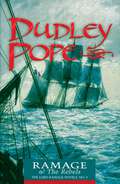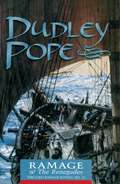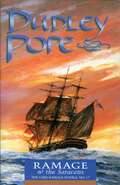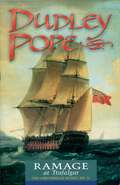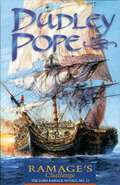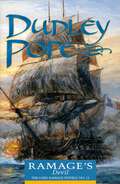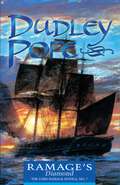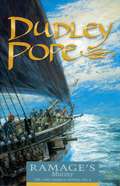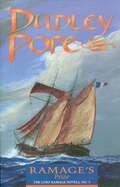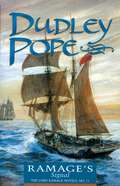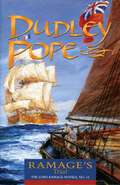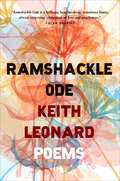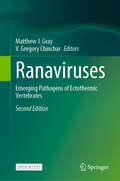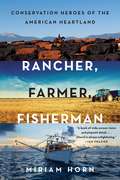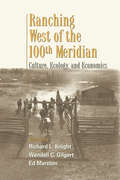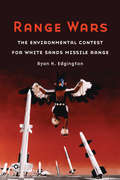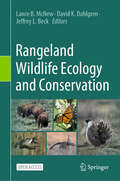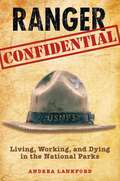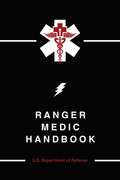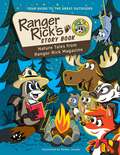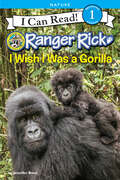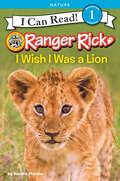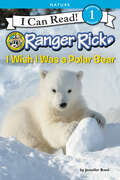- Table View
- List View
Ramage & the Rebels
by Dudley PopeSetting off on a sweep for freebooters in the waters off Jamaica, Ramage and the crew of the Calypso stumble upon a scene of carnage: a sinking British ship, her crew and passengers—men and women alike—ruthlessly murdered at the hands of a French privateer. Supported by his men in a thirst for righteous vengeance, Ramage ferrets out the brigand's name and sets sail to bring him in.
Ramage & the Renegades
by Dudley PopeNelson's crews are standing down and Ramage is on leave when he received secret Admiralty orders to inspect the small island of Trinidad off the coast of Brazil. Reaching the island's shores, Ramage and the crew of the Calypso fetch up in a battle to free several captive merchant ships—and a beautiful woman passenger—as they cross swords with bloodthirsty pirates.
Ramage & the Saracens
by Dudley PopeRamage and the Calypso are sent to Sicily to track down Barbary Coast pirates—the Saraceni—who are capturing slaves and terrorizing fishing villages along the coast. Ramage is ordered to track the pirates to their home and destroy them before they can devastate another Sicilian town—and in the process, he and his crew must attempt to rescue hundreds of Italian prisoners!
Ramage at Trafalgar
by Dudley PopeRamage, finally reunited with his beloved Sarah, hopes to spend at least a few quiet weeks with her. Instead, he is summoned by Admiral Nelson himself. His orders: Ramage is to join Nelson's fleet blockading the combined French and Spanish navies in the port of Cadiz. But Nelson's plan is not merely to blockade the enemy's fleet. He intends to confront it head-on in the biggest naval battle the world has ever seen.
Ramage's Challenge
by Dudley PopeAdmiralty spies are hunting for British officers and allies trapped on the mainland, among them Ramage's first love, Gianna, the Marchesa di Volterra. Ramage returns to the Tuscan coast, where Bonaparte holds a group of hostages for an unknown fate.
Ramage's Devil
by Dudley PopeCaptain Lord Ramage's honeymoon in France is interrupted by a sudden end to the Peace of Amiens. Finding themselves on unfriendly soil just hours before hostilities commence, Ramage and his bride elude the grasp of Napoleon's secret police.
Ramage's Diamond
by Dudley PopeThe youngest captain in His Majesty's Navy, with a reputation for landing impossible assignments, Lord Ramage is dispatched to the Caribbean islands of Martinique and Diamond Rock. The mission seems humdrum: barricade the French within Fort Royal. But when he is sent to sea in the Juno with a crew grown restless and undisciplined under the prior command of a drunk, Ramage realizes his vessel may not be up to battle with the French.
Ramage's Mutiny
by Dudley PopeCaptain Ramage recklessly attempts to free the Jocasta, a British ship, from the Spanish Main stronghold of Santa Cruz. A vicious mutiny has left the Jocasta open to capture by Spain, but sailing the frigate Calypso, Ramage will stop at nothing to rescue the imprisoned vessel, even if it means inciting another mutiny on board his own ship.
Ramage's Prize
by Dudley PopeThe West Indian bases are desperate: post vessels—a vital communications link between England and the West Indies in the war against France—are mysteriously disappearing and no packets have arrived with orders in months. Were the privateers out in full force again? Had Napoleon's navy a secret new weapon? Lieutenant Lord Nicholas Ramage sets out from Jamaica to discover what treachery is threatening to throw the British navy into chaos.
Ramage's Signal
by Dudley PopeThe Calypso and her captain, Lord Nicholas Ramage, venture further into the French-dominated waters of the Mediterranean on an Admiralty mission to sink, burn, and destroy. Aiming to confuse and distract the enemy, Ramage and his men find themselves isolated and outnumbered as they take on the might of Napoleon's fleet.
Ramage's Trial
by Dudley PopeCaptain Lord Ramage and the Calypso return from Devil's Island, but Ramage's new wife, Sarah, is missing. The captain would like nothing better than to sail home immediately, but instead he is ordered to shepherd a lumbering convoy of merchant ships back to England. On the way, bizarre events lead him to a full court martial in Plymouth, presided over by his old nemesis, Rear-Admiral Goddard. Ramage must clear his name—or face a sentence of death!
Rambunctious Garden: Saving Nature in a Post-Wild World
by Emma MarrisA paradigm shift is roiling the environmental world. For decades people have unquestioningly accepted the idea that our goal is to preserve nature in its pristine, pre-human state. But many scientists have come to see this as an outdated dream that thwarts bold new plans to save the environment and prevents us from having a fuller relationship with nature. Humans have changed the landscapes they inhabit since prehistory, and climate change means even the remotest places now bear the fingerprints of humanity. Emma Marris argues convincingly that it is time to look forward and create the "rambunctious garden," a hybrid of wild nature and human management.
Ramshackle Ode: Poems
by Keith LeonardA sparkling debut collection from a Pushcart Prize-nominated poet that makes an ecstatic argument for living Containing joy and suffering side by side, Ramshackle Ode offers elegies and odes as necessary partners to bring out the greatest power in each. By turns celebratory, meditative, tender, and rebellious, these poems reimagine the divisions and intersections of life and death, the human and the natural world, the brutal and the beautiful. Time and again, they choose hope.From an award-winning young poet in the tradition of Marie Howe, Walt Whitman, Gerald Stern, and contemporary American bard Maurice Manning, Ramshackle Ode presents a new voice singing toward transcendence, offering the sense that, though this world is fragile, human existence is a wonderfully stubborn miracle of chance.
Ranaviruses: Emerging Pathogens of Ectothermic Vertebrates
by Matthew J. Gray V. Gregory ChincharThis is a open access book. Ranaviruses, double-stranded DNA viruses (family Iridoviridae) that cause systemic, life-threatening disease in a variety of amphibians, reptiles and fish, have contributed to mass die-offs of both wild and captive populations around the globe. These viruses are emerging and increasingly responsible for population declines of ectothermic vertebrates. Because amphibians, reptiles, and freshwater turtles are suitable hosts and among the most imperiled vertebrate taxa in the world, ranaviruses can have significant impacts on biodiversity and ecosystem function. Additionally, many fish that are raised in aquaculture facilities and traded internationally are suitable hosts; thus, the potential economic impact of ranaviruses is significant. Ranaviruses also serve as a model for understanding viral replication and gene function among large double-stranded DNA viruses, e.g., poxviruses, asfarvirus, and ascoviruses. Lastly, study of the host immune response to ranaviral disease and the identification of viral immune evasion genes that negatively regulate host immune functions provide insight into which specific immune elements are most important in protecting host species against severe disease. The effort to produce a 2nd edition of our earlier work grew out of a recent meeting (1st Global Amphibian and Reptile Disease Conference) held in August 2022. Given the continued research in ranaviruses and ranaviral disease since the first edition, this new book updates the latest information on ranaviruses and provides guidance on how to monitor and manage ranaviruses in cold-blooded vertebrate populations.
Rancher, Farmer, Fisherman: Conservation Heroes of the American Heartland
by Miriam HornThe story of a huge, largely hidden, and entirely unexpected conservation movement in America. Many of the men and women doing today's most consequential environmental work--restoring America's grasslands, wildlife, soil, rivers, wetlands, and oceans--would not call themselves environmentalists; they would be too uneasy with the connotations of that word. What drives them is their deep love of the land: the iconic terrain where explorers and cowboys, pioneers and riverboat captains forged the American identity. They feel a moral responsibility to preserve this heritage and natural wealth, to ensure that their families and communities will continue to thrive. Unfolding as a journey down the Mississippi River, Rancher, Farmer, Fisherman tells the stories of five representatives of this stewardship movement: a Montana rancher, a Kansas farmer, a Mississippi riverman, a Louisiana shrimper, and a Gulf fisherman. In exploring their work and family histories and the essential geographies they protect, Rancher, Farmer, Fisherman challenges pervasive and powerful myths about American and environmental values.
Ranching West of the 100th Meridian: Culture, Ecology, and Economics
by Richard L. Knight Ed Marston Wendell GilgertRecommended by The Nature Conservancy magazine.Ranching West of the 100th Meridian offers a literary and thought-provoking look at ranching and its role in the changing West. The book's lyrical and deeply felt narratives, combined with fresh information and analysis, offer a poignant and enlightening consideration of ranchers' ecological commitments to the land, their cultural commitments to American society, and the economic role ranching plays in sustainable food production and the protection of biodiversity.The book begins with writings that bring to life the culture of ranching, including the fading reality of families living and working together on their land generation after generation. The middle section offers an understanding of the ecology of ranching, from issues of overgrazing and watershed damage to the concept that grazing animals can actually help restore degraded land. The final section addresses the economics of ranching in the face of declining commodity prices and rising land values brought by the increasing suburbanization of the West. Among the contributors are Paul Starrs, Linda Hasselstrom, Bob Budd, Drummond Hadley, Mark Brunson, Wayne Elmore, Allan Savory, Luther Propst, and Bill Weeks.Livestock ranching in the West has been attacked from all sides -- by environmentalists who see cattle as a scourge upon the land, by fiscal conservatives who consider the leasing of grazing rights to be a massive federal handout program, and by developers who covet intact ranches for subdivisions and shopping centers. The authors acknowledge that, if done wrong, ranching clearly has the capacity to hurt the land. But if done right, it has the power to restore ecological integrity to Western lands that have been too-long neglected. Ranching West of the 100th Meridian makes a unique and impassioned contribution to the ongoing debate on the future of the New West.
Ranching, Mining, and the Human Impact of Natural Resource Development
by Raymond L. GoldIn Ranching, Mining, and the Human Impact of Natural Resource Development, Raymond L. Gold observes and reports on people whose lives have been significantly affected by the industrialization of rural communities in the American West. Such community change research is rarely done, so this classic study is invaluable for its real world groundings applicable to a variety of social science theories. The study evolved out of ethnographic research on Western communities done over a full decade.This was the first work of its kind to examine and account for the rise of local citizens' groups on the sense of being a community. Its account of this process covers both ordinarily slow and extraordinarily rapid areas of change in the American West. In this regard it is a contribution to basic social theory, showing clearly the interrelation between small-community and large-society elements of the structure and functioning of community life. No other book brings together the story of social effects of natural resource development projects in the American West.This book shows how to implement a social policy concerning resource development and public agencies. It is intended for people interested in the environment, American society, rural and urban affairs, social impact assessment, and urban structures generally. It is also aimed at industrial and community planners and natural resource development firms.
Range Wars: The Environmental Contest for White Sands Missile Range
by Ryan H. EdgingtonEstablished in south-central New Mexico at the end of World War II, White Sands Missile Range is the largest overland military reserve in the western hemisphere. It was the site of the first nuclear explosion, the birthplace of the American space program, and the primary site for testing U.S. missile capabilities.In this environmental history of White Sands Missile Range, Ryan H. Edgington traces the uneasy relationships between the military, the federal government, local ranchers, environmentalists, state game and fish personnel, biologists and ecologists, state and federal political figures, hunters, and tourists after World War II—as they all struggled to define and productively use the militarized western landscape. Environmentalists, ranchers, tourists, and other groups joined together to transform the meaning and uses of this region, challenging the authority of the national security state to dictate the environmental and cultural value of a rural American landscape. As a result, White Sands became a locus of competing geographies informed not only by the far-reaching intellectual, economic, and environmental changes wrought by the cold war but also by regional history, culture, and traditions.
Rangeland Wildlife Ecology and Conservation
by Lance B. McNew David K. Dahlgren Jeffrey L. BeckThis open access book reviews the importance of ecological functioning within rangelands considering the complex inter-relationships of production agriculture, ecosystem services, biodiversity, and wildlife habitat. More than half of all lands worldwide, and up to 70% of the western USA, are classified as rangelands—uncultivated lands that often support grazing by domestic livestock. The rangelands of North America provide a vast array of goods and services, including significant economic benefit to local communities, while providing critical habitat for hundreds of species of fish and wildlife. This book provides compendium of recent data and synthesis from more than 100 experts in wildlife and rangeland ecology in Western North America. It provides a current and in-depth synthesis of knowledge related to wildlife ecology in rangeland ecosystems, and the tools used to manage them, to serve current and future wildlife biologists and rangeland managers in the working landscapes of the West. The book also identifies information gaps and serves as a jumping-off point for future research of wildlife in rangeland ecosystems. While the content focuses on wildlife ecology and management in rangelands of Western North America, the material has important implications for rangeland ecosystems worldwide.
Ranger Confidential: Living, Working, and Dying in the National Parks
by Andrea LankfordFor twelve years, Andrea Lankford lived in the biggest, most impressive national parks in the world, working a job she loved. She chaperoned baby sea turtles on their journey to sea. She pursued bad guys on her galloping patrol horse. She jumped into rescue helicopters bound for the heart of the Grand Canyon. She won arguments with bears. She slept with a few too many rattlesnakes.Hell yeah, it was the best job in the world! Fortunately, Andrea survived it.In this graphic and yet surprisingly funny account of her and others&’ extraordinary careers, Lankford unveils a world in which park rangers struggle to maintain their idealism in the face of death, disillusionment, and the loss of a comrade killed while holding that thin green line between protecting the park from the people, the people from the park, and the people from each other. Ranger Confidential is the story behind the scenery of the nation&’s crown jewels—Yosemite, Grand Canyon, Yellowstone, Great Smokies, Denali. In these iconic landscapes, where nature and humanity constantly collide, scenery can be as cruel as it is redemptive.
Ranger Medic Handbook
by U.S. Department of DefenseHistorically in warfare, the majority of all combat deaths have occurred prior to a casualty ever receiving advanced trauma management. The execution of the Ranger mission profile in the Global War on Terrorism and our legacy tasks undoubtedly will increase the number of lethal wounds. Ranger leaders can significantly reduce the number of Rangers who die of wounds sustained in combat by simply targeting optimal medical capability in close proximity to the point of wounding. Directing casualty response management and evacuation is a Ranger leader task; ensuring technical medical competence is a Ranger Medic task. A solid foundation has been built for Ranger leaders and medics to be successful in managing casualties in a combat environment. The true success of the Ranger Medical Team will be defined by its ability to complete the mission and greatly reduce preventable combat death. Rangers value honor and reputation more than their lives, and as such will attempt to lay down their own lives in defense of their comrades. The Ranger Medic will do no less.
Ranger Rick's Storybook: Favorite Nature Tales from Ranger Rick Magazine (Ranger Rick: Big Books)
by Rhonda Lucas DonaldStory time with Ranger Rick!Good stories do more than entertain—they teach as well. From its first issue back in 1967, Ranger Rick magazine has distinguished itself by publishing hundreds of stories that capture children&’s imaginations while teaching them about wildlife, ecology, and all of nature. This volume collects some of the best of those stories about a rich variety of wild animals, from unfamiliar creatures in distant lands to familiar ones in our own backyards.
Ranger Rick: I Wish I Was a Gorilla (I Can Read Level 1)
by Jennifer BovéExplore the lives of gorillas with Ranger Rick in this beginning reader with full-color photos of gorillas in the wild! What if you wished you were a gorilla and then you became one? Could you eat like a gorilla? Sleep like a gorilla? Live in a gorilla family? And would you want to? Find out!Ranger Rick explorers can learn all about gorillas in this reader full of fascinating facts, vivid wildlife photographs, a Wild Words glossary, and a hands-on activity about how to make a snack like a gorilla! Ranger Rick: I Wish I Was a Gorilla is a Level One I Can Read, which means it’s perfect for children learning to sound out words and sentences. Whether shared at home or in a classroom, the short sentences, familiar words, and simple concepts of Level One books support success for children eager to start reading on their own.
Ranger Rick: I Wish I Was a Lion (I Can Read Level 1)
by Sandra MarkleDig into the lives of lions with Ranger Rick in this beginning reader with full-color photos of lions in the wild! What if you wished you were a lion? And then you became one? Could you eat like a lion? Sleep like a lion? Live in a lion family? And would you want to? Find out! Ranger Rick explorers can learn all about lions in this reader full of fascinating facts, vivid wildlife photographs, a Wild Words glossary, and a hands-on activity about practicing your lion-quick reflexes!Ranger Rick: I Wish I Was a Lion is a Level One I Can Read, which means it’s perfect for children learning to sound out words and sentences. Whether shared at home or in a classroom, the short sentences, familiar words, and simple concepts of Level One books support success for children eager to start reading on their own.
Ranger Rick: I Wish I Was a Polar Bear (I Can Read Level 1)
by Jennifer BovéExplore the lives of polar bears with Ranger Rick in this beginning reader with full-color photos of polar bears in the wild! What if you wished you were a polar bear and then you became one? Could you eat like a polar bear? Talk like a polar bear? Live in the cold Arctic tundra? And would you want to? Find out!Ranger Rick explorers can learn all about polar bears in this reader full of fascinating facts, vivid wildlife photographs, a Wild Words glossary, and a paws-on activity that shows readers how blubber works using ice water and vegetable shortening! Ranger Rick, the iconic raccoon ambassador from Ranger Rick magazine, asks questions like: Would you want to nap on the snow? Brrr!Ranger Rick: I Wish I Was a Polar Bear is a Level One I Can Read book, which means it’s perfect for children learning to sound out words and sentences. Whether shared at home or in a classroom, the short sentences, familiar words, and simple concepts of Level One books support success for children eager to start reading on their own.
